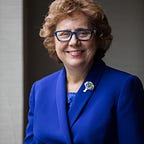I Want to Start a Movement: Let’s Create Space
Every year, my grandmother would buy petunias, which were always in the same three colors: red, white, and blue-purple. She would carefully place them around the yard, always in the same spots as the year before, and different flowers were given affectionate names. Marigolds were “mariangolds” and blue irises, blue iris flags. My dad was more practical with his gardening choices; everything he grew, we could eat. Summers were filled with hundreds of zucchinis, tomatoes, peppers, cucumbers, and basil.
That is where I got my love of growing things from my family.
So, I grew houseplants when I became an adult and didn’t yet have a yard. I learned that you could limit growth by keeping a plant in a pot that is too small, otherwise known as pot-bound.
Humans are like plants and can get stuck. Like the plants with their roots stuffed into the container, we can be confined in our current place — alive but not reaching our full potential.
Being confined is uncomfortable, but being transplanted is challenging in and of itself. When plants are moved, they need to spread out their roots and send up new greenery. They can look a little stressed until they settle into their new space, but then they begin to thrive.
I have those feelings every time I start learning something new. I ask myself, why leave this comfy space? Why not settle for the way I am? Then I remember that I have always enjoyed the new opportunities that growth and change provide. I remember the joy in the new space and remind myself that the transition is worth it. I still have my roots — my values and my belief in the importance of our work. I am only going to grow more if I allow myself the space.
Over the past several months, there have been many team members experiencing similar reflections, and they, too, have given themselves the space to grow, mainly through our new Supervisory Frontline Leadership Cohort Series. This program helps staff grow in the Leader-Leader culture; those who have participated have discovered that their growth has deepened their clarity, team approach, and understanding of our core values at KenCrest. They’re planting themselves or rooting themselves even more profound in their “WHY’ and what authentic leadership looks like.
Take it from Tia Gibbs, a Program Manager in Pennsylvania Region Two, Philadelphia/Bucks Community Living; she recently shared her reflection on the program:
“To be a good leader, you must be able to communicate and listen to those on your team effectively. Leadership comes with challenges that require you to have that quality to break down those challenges and figure out what’s needed together as a team. Going into the Supervisory Frontline Leadership training, I thought I had it all figured out. Boy, was I wrong! In those seven months of training, they taught us that even the best leaders could use adjustments. It was a joy to meet with my peers monthly to discuss different strategies with one another and get different points of view. Discuss our different supervision styles, also known as The DISC review. Then, I understood that we all have some things in our roles that could benefit from leadership training. (The leadership training taught me) Not to sink the ship; instead, I apply what I’ve learned to build a stronger team to keep the ship afloat. I learned that a leader empowers, has integrity, is consistent, believes in core values, leads by example, communicates effectively and actively listens. Frontline leadership training is designed to build strong relationships, either at work or in your personal lives, and I highly recommend this training to all who can take it!”
Our company logo is a tree for a very good reason.
This short blog series will be dedicated to our roots and our possibilities if we create some space.
